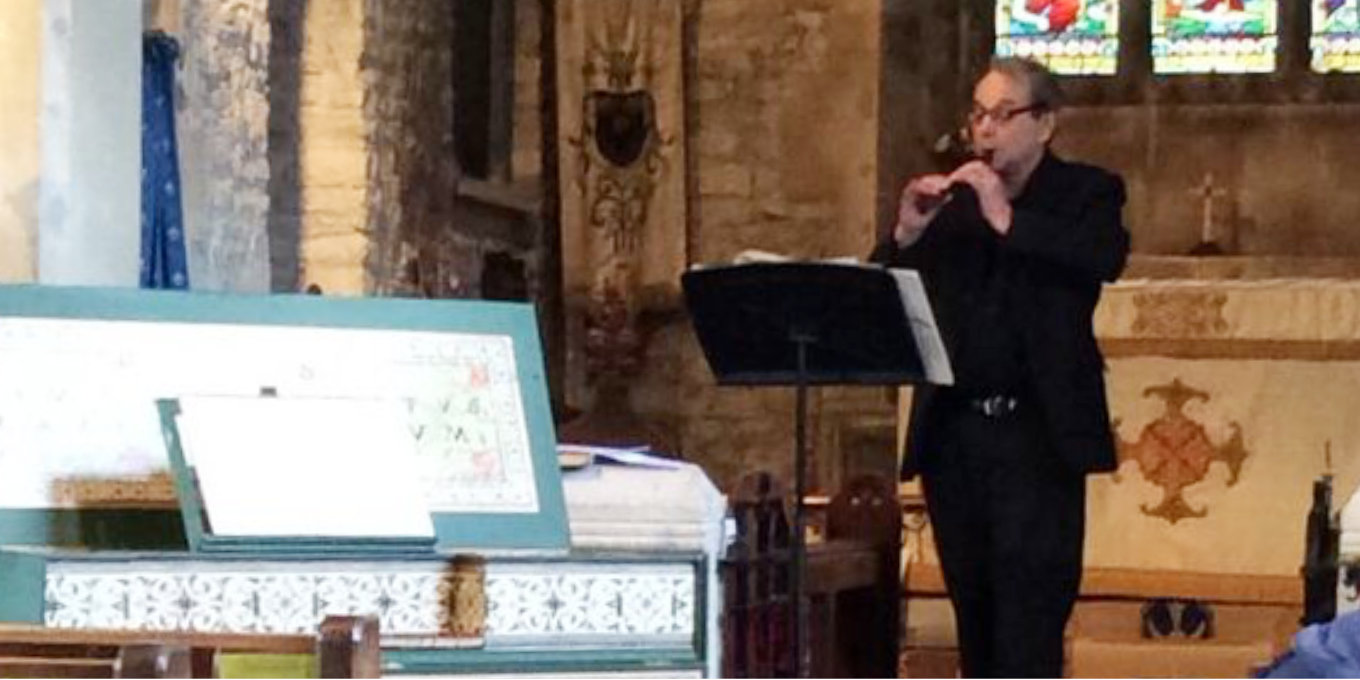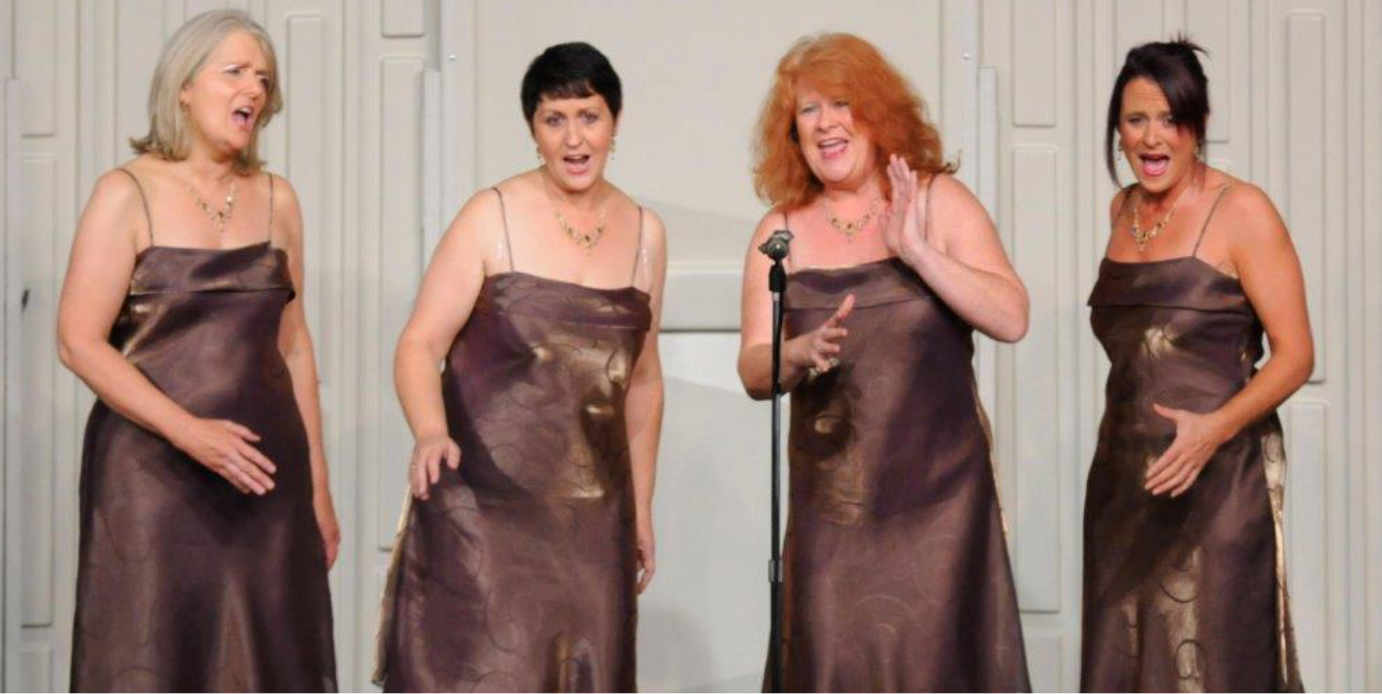Line-up 2016
The Tender Soothing Flute

A brief introduction to the recorder and its music
Chris Lovell
Chris first picked up a recorder at the age of 6, and subsequently played consort music with the Society of Recorder Players and other groups. During teenage, he decided to take up a “proper” instrument (the clarinet), but a perceptive teacher encouraged him to explore the extensive solo and consort repertoire for the recorder. He leads the Farmborough church choir and sings in various ad hoc groups. He organizes a promenade concert of renaissance vocal music in Wells Cathedral each January.
Philip Evry
After studying at the Royal Academy of Music, Philip has devoted his career to music education and he is greatly in demand as a pianist in chamber music groups and as organist. He was accompanist for the Bath Male Voice choir for fourteen years, and now accompanies the Mendip Male Voice Choir. Recently he has played our church piano in a workshop performance of Britten’s Noyes Fludde and the first performance of Light Invisible by Farmborough composer, Prof George Odam. Philip’s publications include several musical arrangements for recorder consorts.
Gloucester Waites
Tudor & Jacobean Musicians

Tudor & Jacobean form of the Waites
The Waites of Gloucester were the City musicians, liveried and paid for by the civic authorities, between the 1590’s and the early 1800’s. We represent the Tudor & Jacobean form of the Waites, the kind of band who would have played as Queen Elizabeth’s reign gave way to King James I.
We also play music from the early Tudor period, when, although there were no Waits extant in Gloucester, many great cities like York and Norwich had Waits bands. Their repertoire was drawn chiefly from chansons and other popular tunes of the day, and, sometimes, sacred music.
Despite their relatively late foundation, the Waites of Gloucester (that is the spelling most frequently used in the Gloucester archives) established their role quite quickly and became a significant part of the civic life of Gloucester.
The main instruments of the Waites (though not the only ones) were woodwind. ‘Waites pipes’ were Shawms. However, the Gloucester archives refer to their Waites as having “plaied on the Rcorder (sic) as the Waites for the quarter of yere passed at iiij of the clock in the morninges in the Chief streetes of this city shall therefore, and in recompense of their service at the solempne vsuall assemblies … have xx s. for a Reward and xx s. for their liuerreys to be paied by the stewardes of this City”.
In 1633/4 the Gloucester Cathedral Treasurer’s accounts record a payment “to some of the Waytes for playinge in the Quire per Consensum Magistri Decani”. Sadly it doesn’t tell us what they were playing: it would be fascinating to find out exactly what part, if any, they played in the actual services. Certainly the Cathedral paid “Richard Brodgate Iunior for playinge on the Sagbott the whole year. Sadly we no longer have a regular sackbut player. Nevertheless, we hope that we form “an able and sufficient consort”, to quote a reference to the Waites in the Gloucester Archives. Please forgive us any lapses from that enviable standard: our forebears were full-time professional musicians, whereas none of us is!
This evening our programme is of Spanish music, most of it belonging to the later 1500’s. Given the events surrounding the Armada, it is perhaps unlikely that the Waites in Gloucester would have played much Spanish music, but it is remarkable how widely music did travel in Tudor times, so we will not be too apologetic about exploring a repertoire that offers some real gems.
David Kniveton
Organist / Pianist and Flutist

Organ and Piano Recital
David was born in the Isle of Man and studied for a music degree at Bath Spa University in which he specialised in performance in the final year. David enjoys the variety of playing the flute for local orchestras (including the Theatre Royal down in the pit!), solo recitals for care homes and churches, playing the piano for weddings (all over Somerset) and playing the organ at St Luke’s Church, Wellsway where he has been the organist and choir master since 1999. Juggling these different instruments leaves little time for hobbies although he does enjoy trips out with his wife Sarah and two daughters Elizabeth (14) and Lucy (11) and plays badminton once a week. He is also a keen dog walker with his faithful Jack Russell Lily.
Class Act
Jazz Quartet

Classic jazz standards
Guitarists John Huggins and Mark Sinfield are joined by Bristol bassist, Jim Pimpernel and flautist Gareth Williams to form the quartet - Class Act. Their music ranges from classic jazz standards to blues, bossas and popular tunes from the great American songbook, all played in a cool post war bebop style.
The group was formed a couple of years ago and has done a number of gigs in the south west. Next up is a late night cafe jazz event at Thornbury Arts Festival on April 16th.
H club
Fun-loving A Cappella Singers

Members of the sixty-strong multi-award-winning Great Western Chorus, H club (incorporating “44U” Quartet) brings you quality close harmony singing. We are a male a cappella group (4-8 voices) and we provide entertainment suitable for any occasion: weddings, cabaret spots, shows, concerts, parties. Wherever we perform, guests just love our casual style of singing - songs like the Madness hit "It Must Be Love", the Elvis Presley ballad "Can't Help Falling In Love", the Beatles’ “All You Need is Love" and even a medley from Disney's "Jungle Book".
Jigsaw
Mixed Quartet Singers

Jigsaw are four best friends who met through their love of singing, there are two couples in Jigsaw – Ali and Pete aka ‘Nooj’ – Donna and Keith aka ‘keef’.
Ali and Donna have known each other the longest. They started singing together more than 20 years ago and discovered barbershop along the way. Both sing in the UK quartet ‘Havoc’ and are also founding members of the successful Ladies barbershop group, Fascinating Rhythm, currently ranked 5th in the UK.
Keef and Nooj started singing together in the quartet ‘QED’ back in 2004 and went on to sing together in ‘Steel’ and are now in a new quartet ‘The Brit Pack’.
All four of them won their first UK quartet gold medals in the same year, 2007, Ali singing tenor and Donna singing bass in ‘Havoc’ and Keef (lead) and Nooj (baritone) in ‘QED’.
Even though they are all close friends they hadn’t considered singing together until the advent of mixed barbershop quartet singing, so this new form of singing has actually brought these firm friends even closer together.
Jigsaw are ranked 5th in the world for mixed barbershop quartet singing after their success at the recent World Championships in Munich in March 2016.
If you want to take Jigsaw home with you ask them about their new CD, it contains some great barbershop songs and pop classics.
They are thrilled to be singing at the Three Towers Festival Concert at All Saints Church, Farmborough.
Havoc
Ladies Quartet

In October 2002 Ali, Linda, Donna and Jo decided to get together to sing, “just for fun” - and Havoc was created!
Since then they have had ‘serious’ fun and have represented the best of A cappella, singing at events and competitions throughout the UK, Ireland, Holland and USA.
Ali and Donna also sing in the mixed quartet Jigsaw and Linda and Jo are both directors; Linda directs The Great Western Chorus and Jo directs the ladies chorus -Fascinating Rhythm.
Havoc are very lucky to be able to enjoy and share this ‘hobby’ with their partners, Pete, Martin, Keith and Steve, so they hope you’ll enjoy their new octet with Havoc and partners - Hav8!
Ali, Linda, Donna and Jo have been singing together for over 12 years and are still having fun and wish you all an enjoyable evening of close part harmony!
Wells Cathedral School
String quartet

Chamber Music Recital
Students at Wells Cathedral School present a recital of chamber music by Bach, Haydn and Shostakovitch.